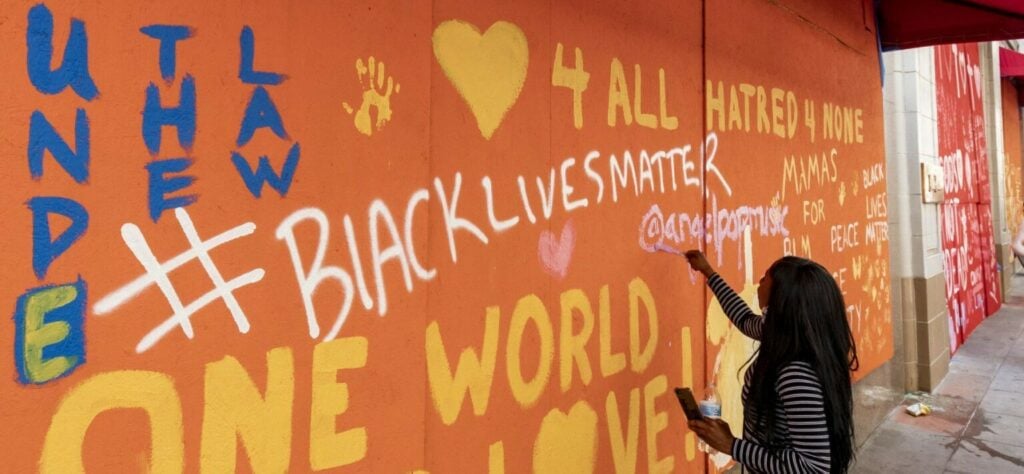Race, ethnicity, and mental health
Reviewed by Stephanie Steinman, PhD, CSAC

Along with factors like your gender identity, sexuality, dis/abilities, and socioeconomic status, your race and ethnicity are important parts of who you are. They affect how others see and treat you, how you experience the world, and how you think about yourself.


Race and ethnicity are categories people have invented, rather than fixed realities, but they affect your life and your health in very real ways.
What is race?
Race often gets defined by certain elements of a person’s appearance, such as skin color, facial features, and hair texture. In the United States, the main racial groups listed on the federal census are Black, Asian, American Indian/Alaska Native, Native Hawaiian/Pacific Islander, and White, but there are other races as well.1 Many people have two or more racial backgrounds.
What is ethnicity?
This word is sometimes used to mean “race,” but it’s also used more broadly to talk about the people you’re descended from. It can include where your ancestors lived and what languages, traditions, beliefs, foods, and histories you’ve inherited and learned. The US census deals with ethnicity in a limited way by asking whether you’re of Hispanic or Latino origin or not.2 But there are many different ethnicities, and lots of people have a mix of more than one.
How do race and ethnicity affect mental health?
Your cultural background can offer you traditions, connection, and community. It can give you a way to fit your experiences—and those of your ancestors—into a bigger historic and cultural picture.
Your race, ethnicity, and cultural background can influence important mental health factors, including:
- The way you communicate verbally and nonverbally
- How health care providers interact with you
- How you think about and cope with mental health concerns
- How, whether, and where you seek help
- The ways your symptoms show up
- What kind of family support you can count on
- Whether you feel shame or stigma around mental illness
Your race and ethnicity also affect what kinds of experiences you have with racism. Racism is prejudice, discrimination, or hostility that’s based on race, ethnicity, or perceived race or ethnicity. It happens on a person-to-person level, and it causes injustices and inequalities in larger-scale (or “systemic”) settings. Racism can be obvious or more subtle.
How does racism affect mental health?
Throughout American history, Indigenous people, Black people, Asian people, Latinx people, Jews, immigrants, and other ethnic groups have been denied equal power, respect, safety, and resources due to racism.3 The chronic stress of these experiences can cause or worsen depression, anxiety, and other mental health issues.4 It can also harm a person’s physical health and shorten their life.5
Being on the receiving end of racist abuse, violence, and inequality can be traumatic. Seeing or hearing about this happening to a loved one, community member, or stranger of the same race or ethnicity can cause trauma as well. In addition, people of color living with mental health diagnoses may experience discrimination that makes it difficult to access treatment.
Systemic racism and White supremacy
Systemic racism, sometimes also called structural or institutional racism, describes systems where racial or ethnic bias has become established in the way things work.6 In these systems, one racial or ethnic group—most often White people—tends to benefit while other groups are harmed. In one example, the historic segregation and oppression of Black, Indigenous, Latinx, and Asian people has formed the foundation of a racial wealth gap that now drives inequalities in homeownership rates, household wealth, and educational funding.7, 8
Systemic racism is well documented in schools, housing, medical care, mental health care, workplaces, media and entertainment, voting, policing, and the justice system.
White supremacy (sometimes called “White nationalism”) isn’t the only kind of racism, but it’s common and influential in the United States and beyond. It’s a way of thinking based on the racist idea that White or white-skinned people are more valuable and should hold more power than people with darker skin tones, and that their beliefs are superior.
Individual racism
On a personal level, people can express racism unconsciously in microaggressions, which are subtle actions or statements that convey disrespectful or offensive messages.9 People also express racism in the form of outright bias incidents or hate crimes, which are rising in the US.10 Anti-Asian attacks and discrimination, anti-Semitic and anti-Muslim incidents, and attacks on Latinx people are just a few examples.11, 12, 13
Race-based traumatic stress
Marginalized people may develop race-based traumatic stress (RBTS)—sometimes called race-based trauma or racial trauma—after being exposed to race-related inequality, stress, or trauma. RBTS affects someone’s mental, emotional, and physical well-being, and its symptoms can look similar to posttraumatic stress disorder (PTSD).
Internalized prejudice
If you absorb and start to believe in negative biases about a group you belong to, it can cause poor mental health outcomes like:14
- Depression
- Anxiety
- Lowered self-esteem
- Shame
- Anger
- Feelings of helplessness and hopelessness
- Health-damaging behaviors
- Addiction
- Devaluing people of your own background
Generational trauma
If your ancestors were traumatized by oppression, it can raise your risk for certain mental health conditions. Generational trauma can take the form of coping mechanisms that are passed from one generation of a family to the next. It may also show up as changes in the ways our genes express themselves. This inherited trauma has been linked to past familial experiences including slavery, genocide, racism, and the Holocaust.
Healing from stress and trauma
A multiculturally competent, trauma-informed therapist with experience addressing your specific concerns can help you talk about, address, and heal from discrimination-based mental health struggles.15 You don’t have to choose a provider with the same racial or ethnic background as you, but you should feel comfortable trusting them with difficult emotions and experiences. For more guidance, read our article on finding a therapist.
In addition to therapy, the following strategies can help.
Practicing emotional regulation techniques like self-care, stress management, mindfulness, and meditation may help ease symptoms of stress, anxiety, depression, burnout, and more.
Healing in community can look like finding a support group, participating in group therapy, or gathering with people from similar backgrounds to talk and share experiences. Connecting with people who’ve dealt with similar experiences of discrimination, trauma, racism, or internalized oppression can help you feel less alone and be an avenue toward joy, power, and validation.
If you’re White, it can help to connect with other White people and talk about your own cultures of origin. This can be a good start in learning how to work against racism, be a respectful ally to people of color, and choose healthier alternatives to oppressive habits you’ve unintentionally internalized. For White mental health professionals, it’s essential to seek out cultural competence training in order to provide the best care for your clients.16
Connecting to your culture can give you a sense of yourself in relation to history, as well as a place to check in and get your bearings. Learning about your cultural background and observing positive celebrations or rituals with others can bring meaning and joy. In addition, inviting others into your traditions and respectfully participating in other people’s traditions can build cross-cultural respect and understanding.
Learning what your own biases are (and how to counter them) is important, especially if you were born into racial, ethnic, or other forms of privilege. You can start this process by taking an implicit bias test.17
How to find support
People of every race and ethnicity deserve access to culturally competent mental health care. Browse our directory to find a licensed therapist near you. Under “Refine your search,” select “Therapist identity” to filter by race, ethnicity, or gender, among other options.
If you’re in crisis and need help right away, call or text the 988 Lifeline at 988 or contact the Crisis Text Line by texting HOME to 741741.

Sources
1 https://www.census.gov/quickfacts/fact/note/US/RHI625221/
2 https://www.census.gov/quickfacts/fact/note/US/RHI725222/
3 https://home.treasury.gov/news/featured-stories/racial-inequality-in-the-united-states/
4 https://psycnet.apa.org/record/2019-12566-007/
5 https://www.npr.org/sections/health-shots/2023/03/28/1166404485/weathering-arline-geronimus-poverty-racism-stress-health/
6 https://www.ncbi.nlm.nih.gov/pmc/articles/PMC8688641/
7 https://www.brookings.edu/essay/homeownership-racial-segregation-and-policies-for-racial-wealth-equity/
8 https://edbuild.org/content/23-billion/
9 https://hbr.org/2022/05/recognizing-and-responding-to-microaggressions-at-work/
10 https://usafacts.org/articles/which-groups-have-experienced-an-increase-in-hate-crimes/
11 https://www.asianpacificpolicyandplanningcouncil.org/wp-content/uploads/Press_Release_4_23_20.pdf
12 https://www.cbsnews.com/news/antisemitic-anti-muslim-incidents-israel-hamas-war-anti-defamation-league/
13 https://www.nbcnews.com/news/latino/hate-crimes-latinos-see-significant-increase-rcna123211/
14 https://www.ncbi.nlm.nih.gov/pmc/articles/PMC5386401/
15 https://www.ncbi.nlm.nih.gov/pmc/articles/PMC8689164/
16 https://psycnet.apa.org/record/2022-66265-001/
17 https://implicit.harvard.edu/implicit/user/agg/blindspot/indexrk.htm
About the author
The editorial team at therapist.com works with the world’s leading clinical experts to bring you accessible, insightful information about mental health topics and trends.
Related articles

Race and healing: Expanding the conversation
In two panel discussions, six clinicians of color have a frank conversation...

Unhealed bodies: Looking at ancestral trauma
Resmaa Menakem, author of My Grandmother’s Hands, discusses racialized trauma...

What is race-based traumatic stress (RBTS)?
RBTS is a type of chronic stress stemming from racism and race-related...

Easing access to therapy for Black women and girls
People of color are much less likely to receive mental health care. In response...
